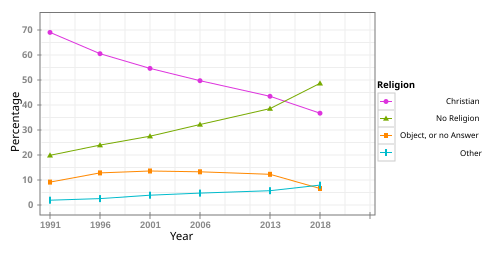
Secular humanism is a philosophy, belief system, or life stance that embraces human reason, logic, secular ethics, and philosophical naturalism, while specifically rejecting religious dogma, supernaturalism, and superstition as the basis of morality and decision-making.
Irreligion is the absence or rejection of religious beliefs or practices. It encompasses a wide range of viewpoints drawn from various philosophical and intellectual perspectives, including atheism, agnosticism, skepticism, rationalism, and secularism. These perspectives can vary, with individuals who identify as irreligious holding a diverse array of specific beliefs about religion or its role in their lives.
Jewish atheism is the atheism of people who are ethnically and culturally Jewish.

Irreligion is common throughout all provinces and territories of Canada. Irreligious Canadians include atheists, agnostics, and secular humanists. The surveys may also include those who are deists, spiritual, pantheists. The 2021 Canadian census reported that 34.6% of Canadians declare no religious affiliation, which is up from 23.9% in the 2011 Canadian census and 16.5% in the 2001 Canadian census. According to Ontario Consultants on Religious Tolerance, among those estimated 4.9 million Canadians of no religion, an estimated 1.9 million would specify atheist, 1.8 million would specify agnostic, and 1.2 million humanist.
The Rationalist Society of Australia (RSA) promotes the interests of rationalists nationally in Australia. Originally formed as the Victorian Rationalist Association, the society originated in a meeting of freethinkers in the University of Melbourne in 1906. It is the operational arm of the rationalist movement in Australia.
Accurate demographics of atheism are difficult to obtain since conceptions of atheism vary considerably across different cultures and languages, ranging from an active concept to being unimportant or not developed. Also in some countries and regions atheism carries a strong stigma, making it harder to count atheists in these countries. In global studies, the number of people without a religion is usually higher than the number of people without a belief in a deity and the number of people who agree with statements on lacking a belief in a deity is usually higher than the number of people who self-identify as "atheists".
Discrimination against atheists, sometimes called atheophobia, atheistophobia, or anti-atheism, both at present and historically, includes persecution of and discrimination against people who are identified as atheists. Discrimination against atheists may be manifested by negative attitudes, prejudice, hostility, hatred, fear, or intolerance towards atheists and atheism or even the complete denial of atheists' existence. It is often expressed in distrust regardless of its manifestation. Perceived atheist prevalence seems to be correlated with reduction in prejudice. There is global prevalence of mistrust in moral perceptions of atheists found in even secular countries and among atheists.

The Union of Rationalist Atheists and Agnostics is the only nationwide association of atheists and agnostics in Italy. It is independent from political parties or lobbies and numbers around 3,000 members.
Atheism, in the broadest sense, is an absence of belief in the existence of deities. Less broadly, atheism is a rejection of the belief that any deities exist. In an even narrower sense, atheism is specifically the position that there are no deities. Atheism is contrasted with theism, which in its most general form is the belief that at least one deity exists.

Atheism, agnosticism, scepticism, freethought, secular humanism or general irreligion are increasing in Australia. Post-war Australia has become a highly secularised country. Religion does not play a major role in the lives of much of the population.
In the United States, between 4% and 15% of citizens demonstrated nonreligious attitudes and naturalistic worldviews, namely atheists or agnostics. The number of self-identified atheists and agnostics was around 4% each, while many persons formally affiliated with a religion are likewise non-believing.
A 2023 poll by the Pew Research Center found that 4% of Americans in the United States self-identified as atheists. This is an increase from 3.1% of Americans in 2014. However, in 2014, 9% of Americans agreed with the statement "Do not believe in God" while 2% agreed with the statement "Do not know if they believe in God". According to a poll by non-profit PRRI in 2023, 4% of Americans were atheist and 5% were agnostic. Polling by Gallup in 2022 showed that 17% of respondents replied "No" when asked "Do you believe in God?" in a binary fashion, but when worded differently in 2023, Gallup found that 12% of respondents replied they "Do not believe in" God and 14% replied they were "Not sure about" the existence of God. According to Gallup, there are variations in their polling results because they ask about God in three different wordings, each with a different result.
As of 2020, 20% of Singaporeans have no religious affiliation. The rate of irreligion is different among ethnic groups of Singapore: about 26% of Chinese residents have no religion, compared to just 0.4% of Malay residents and 2.2% of Indian residents. Age is also an important factor, as around 24% of people aged 15 to 24 indicated they had no religious connection, compared to 15% of residents aged 55 and over in the last census.
Irreligion in the United Kingdom is more prevalent than in some parts of Europe, with about 8% indicating they were atheistic in 2018, and 52% listing their religion as "none". A third of Anglicans polled in a 2013 survey doubted the existence of God, while 15% of those with no religion believed in some higher power, and deemed themselves "spiritual" or even "religious".

Irreligion in Ireland pertains to the population of Ireland that are atheist, agnostic, or otherwise unaffiliated with any religion. The 2022 census recorded that 14% of the population was irreligious; the second largest category after Roman Catholicism. The population was traditionally devoutly Catholic throughout much of Ireland's modern history, with a peak of 94.9% identifying as Catholic in the 1961 census. This percentage has declined to 69% in the 2022 census, the lowest recorded. Conversely, those with no religion made up less than 0.1% of the population in 1961; the proportion grew slowly until the 1991 census where it began to rapidly increase to its current share of 14% of the population in 2022.
In the Philippines, atheists and agnostics are not officially counted in the census of the country, although the Philippine Statistics Authority in 2020 reported that 43,931 Filipinos have no religious affiliation or have answered "none". Additionally, an undated study by the Dentsu Communication Institute in Japan claimed that around 11 million or 11% of Filipinos are irreligious. Since 2011, the non-religious increasingly organized themselves, especially among the youth in the country. There is a stigma attached to being an atheist in the Philippines, and this necessitates many Filipino atheists to communicate with each other via the Internet, for example via the Philippine Atheism, Agnosticism and Secularism, Inc. formerly known as Philippine Atheists and Agnostics Society.
Irreligion in Latin America refers to various types of irreligion, including atheism, agnosticism, deism, secular humanism, secularism and non-religious. According to a Pew Research Center survey from 2014, 8% of the population is not affiliated with a religion. According to Latinobarómetro, the share of irreligious people in Latin America quadrupled between 1996 and 2020, from 4% to 16%.
The secular movement refers to a social and political trend in the United States, beginning in the early years of the 20th century, with the founding of the American Association for the Advancement of Atheism in 1925 and the American Humanist Association in 1941, in which atheists, agnostics, secular humanists, freethinkers, and other nonreligious and nontheistic Americans have grown in both numbers and visibility. There has been a sharp increase in the number of Americans who identify as religiously unaffiliated, from under 10 percent in the 1990s to 20 percent in 2013. The trend is especially pronounced among young people, with about one in three Americans younger than 30 identifying as religiously unaffiliated, a figure that has nearly tripled since the 1990s.
Irreligion in Romania is rare. Romania is one of the most religious countries in Europe, with 92% of people saying that they believe in God. Levels of irreligion are much lower than in most other European countries and are among the lowest in the world. At the 2011 census, only 0.11% of the population declared itself atheist, up from the 2002 census, while 0.10% do not belong to any religion. While still one of the most religious countries in Europe, practicing, church and mass attendance is quite low, even compared to some less religious countries than Romania. It is mainly practiced by elderly people, mainly in rural areas, while in urban areas church attendance and practice is much lower. As of 2021, almost 85% are declared religious, of which about 73% are declared orthodox, 12% other religions, about 1% atheists or irreligious and about 14% declared nothing about religion.






